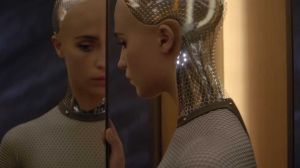Oscar Isaac
Ex Machina
Ex Machina, or if you like ‘Gauge Against The Machine’, is a bold study of the moral decisions artificial intelligence will place before us.
Alex Garland’s first movie as both writer and director looks at how inventors in the near future will soon be playing God in their efforts to give machines consciousness.
Caleb, played by Domnhall Gleeson is a 26-year-old coder at the world’s largest internet company – the cunningly titled BlueBook. He wins a competition to spend a week at a private mountain retreat belonging to the generously-bearded Nathan, the reclusive CEO of the company.
But when Caleb arrives at the remote location he finds that he will have to participate in a strange and fascinating experiment in which he must interact with the world’s first true artificial intelligence, housed in the body of a beautiful robot girl, Ava.
Caleb must perform the ‘Turing test’ on Ava, to deduce if robots can demonstrate self-governing human tendencies. If disguised, would you know it is a robot? Is artificial intelligence even ethical?
If Stephen Hawking has warned that self-programming computers could soon pose a major threat to civilisation, it’s certainly a subject not too far removed from reality.
It is no surprise that the robot played by Swedish actress Alicia Vikander gains human likeness and that we begin to empathise, but the film asks intriguing questions as to the ‘gift’ of consciousness Ava has had bestowed upon her.
With some ingenious CGI, and one can imagine a lot of time shoehorning into a tight fitting costume, Vikander is captivating. The actress is an ex-ballerina and her graceful yet overly computed movement and facial gestures, are extremely subtle and delicate, be it through an incline of the neck, a programmed blink or a measured step. She is deliberately not fully formed as an AI – which poses questions about her inventor – but her increasing recognition and comprehension are cleverly judged.
Oscar Isaac as the reclusive tech genius Nathan is by day a pumped-up techno genius, by night an egomaniacial beer swilling cynic. He plays the polar opposite of the layabout musician in last year’s Inside Llewyn Davis and is both terrifying and extremely charming. Gleeson is perhaps the weak link here, his character, a little too one-dimensional and straining under a Noo Yoik accent.
Essentially a three-hander with weighty subject matter, and an oppressive research lab setting, the mood of Ex Machina quickly gets moody and overwhelming. But at least Garland finds time for a sprinkling of humour, including one marvellously funny disco sequence featuring Oliver Cheatham’s 1983 classic Get Down Saturday Night. So good, I was humming it all the way home.
With a film with essentially just three speaking roles, the dramatic pacing does sag, but it’s a clever take not just on what makes us human but our responsibilities.
Obvious comparisons with Blade Runner and more recently Charlie Brooker’s Black Mirror, took over when it all got a bit too gloomy, but a twisty last 20 minutes bring a satisfying punch to the end of the movie.
Now you all be nice to Siri now, folks.
CINEMA
4*
Inside Llewyn Davis
The Coen brothers’ general shtick is of an ordinary guy swept up by the winds of fate and deposited reeling from the torment at the end of the movie.
This could be a hippy shmuck (The Big Lebowski), a professor shmuck (A Serious Man) or a screenwriter schmuck (Barton Fink).
In this case it’s Llewyn Davis, a folk singer shmuck in 1961 New York, half-heartedly trying to make it big.
His last partner committed suicide, while Davis also passes up the royalties from a catchy novelty song to quickly cash a one-off cheque.
Davis carries his sadsack personality round with him, sleeping on couches, screwing up career opportunities and dismissing the people who care about him. The lead character, played by Oscar Isaac is terrific in the role, someone defiant in his own inadequacy. He is a hard guy to get along with. But you can still root for him and his loserish charm. Davis also has some talent as seen in some cracking musical performances, but he’s the guy at the end of an era, too short-sighted to see the bigger picture.
He must have had some cojones to have a brief fling with his friend Jean, played by Carey Mulligan. Who also happens to be the better half of his friend Jim, played by Justin Timberlake.
Davis is not unloved or totally unlikeable. Mulligan gets better with every film she’s in, and her character Jean notably curves a smile when Davis retrieves a friend’s cat that he carelessly let escape into a wintry New York. And his nephew sweetly composes a message to him on an Etch-A-Sketch.
And yet like its leading character and 2009’s A Serious Man, this film is just too hard to get along with. The journey is bafflingly cyclical. The dead ends along the way aren’t the narrative wrinkle. This is a film about both pursuing the talent you have, despite your own character faults, but also knowing when to give up. But the film seems too knowing and wry, like you’ve missed the punchline of a joke.
The Coens’ movies are willfully left of centre, the filmmakers almost tweaking the nose of the audience as it leads them through the story.
But even if it’s a narrative shaggy-dog story like Lebowski, or a sparse, tense drama, like No Country for Old Men, there is normally a terrific pace and verve to their storytelling. This one seems to revel in false starts, dangling sentences, and frustrated emotions.
Inside Llewyn Davis is certainly another intriguing ride, and you’re happy to submerge yourself in the smudgy grey apartments, dingy nightclubs, and quirky folk tunes of the era.
But though as engaging, and darkly funny as all of their work (a highlight is a dinner party meltdown when Davis is gently asked to perform a song) the film never quite delivers its killer chorus. Mostly ignored by Oscar voters, ultimately it’s as cold as the harsh winter wind that buffets this deluded shmuck.
4*
CINEMA



